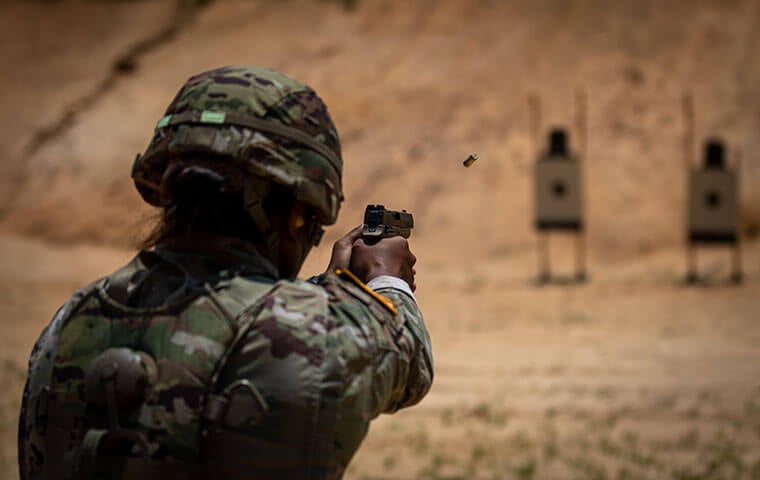 A Soldier assigned to 3rd Special Forces Group (Airborne) fires her pistol during best squad competition at Camp Mackall, NC, on June 27, 2022. The competition tests the squad's basic soldier skills, tactical and technical proficiency, and team cohesion in physical fitness, land navigation, rifle and pistol marksmanship and tactical operations. (Army photo by Spc. Raymon Tibbs)
By: FEDweek Staff
A Soldier assigned to 3rd Special Forces Group (Airborne) fires her pistol during best squad competition at Camp Mackall, NC, on June 27, 2022. The competition tests the squad's basic soldier skills, tactical and technical proficiency, and team cohesion in physical fitness, land navigation, rifle and pistol marksmanship and tactical operations. (Army photo by Spc. Raymon Tibbs)
By: FEDweek StaffBased on feedback provided by female special operations soldiers as well as their male colleagues the Army is taking steps to ensure that everyone in the ranks has the same chance to display their talents.
In a study released earlier this week, the Army Special Operations Command (USASOC) offered 42 recommendations that would place soldiers of both genders on equal footing without compromising standards.
“It is not about providing accommodations for women,” said USASOC Command Sgt. Maj. JoAnn Naumann. “It’s providing tools that allow women to maximize their performance and continue to serve at all levels and across time.”
The recommendations come after service and command leadership reviewed the results of a yearlong study of the issue in 2021, during which they conducted more than 40 focus groups and interviews. More than 5,000 respondents aired their feelings about equipment fitting, childcare, gender bias, social support, sexual harassment, pregnancy and postpartum, morale and wellbeing.
Roughly 44 percent of the female soldiers who took part in the study said that ill-fitting helmets, armor and ruck systems impeded their ability to perform basic maneuvers and skills. Women respondents also noted that planning for pregnancies also had adverse effects on their careers.
Postpartum challenges weighed heavily upon many female respondents. They came forth with problems they had with depression, stress and anxiety, the inability to perform at the same level as their peers, lactation, maternity leave, and abdominal stretching that occurs during pregnancy.
While 80 percent of all male participants said they had no problem with serving alongside women in the special-operations community, the researchers noted that senior non-commissioned officers were most likely to offer “gender based comments and attitudes.”
The team chalked such comments up as generational differences.
“Although disappointed by some of the findings and comments in the study, we are committed to addressing these issues with candor and transparency,” said Lt. Gen. Jonathan Braga, commander of USASOC. “To change culture takes time.”
The Army is citing changes currently underway that would tackle some of the expressed concerns. Special Forces groups at Fort Carson, Colorado, and Fort Liberty, North Carolina, are either up and running or in the works. Researchers at the Army Research Institute of Environmental Medicine at Natick, Massachusetts, are studying how the body responds to extreme and prolonged training, with a focus upon health and physiology needs of female soldiers.
The Army Combat Capabilities Development Command at Aberdeen Proving Ground, Maryland, is working on modernization of women’s dress and duty uniforms, as well as body armor that would provide a better fit for them.
Trump to move Space Command headquarters out of Colorado
National Guard Order Calls for Hiring More Fed LEOs, Military Unit Under Interior, DHS, Justice
Audit: Rise in ‘Severe Staffing Shortages’ at VA Medical Facilities
Marines Seek New Boots on the Ground
Can My Military Discharge be Upgraded? Yes
The Rules for Getting Both Military Retired Pay and a Federal Annuity
Credit for Military Service for Federal Retirement Annuities

